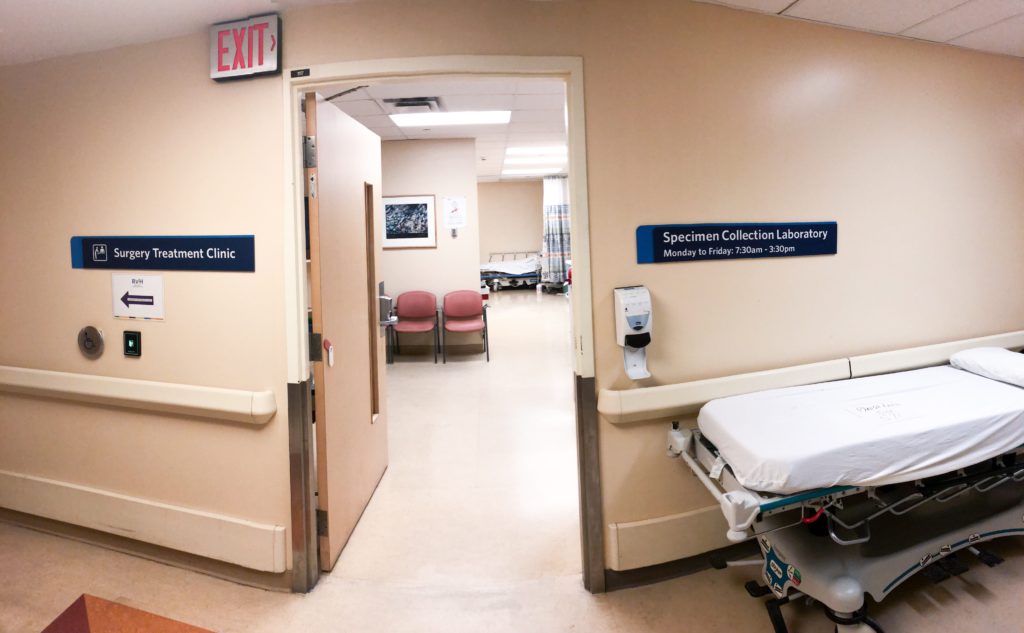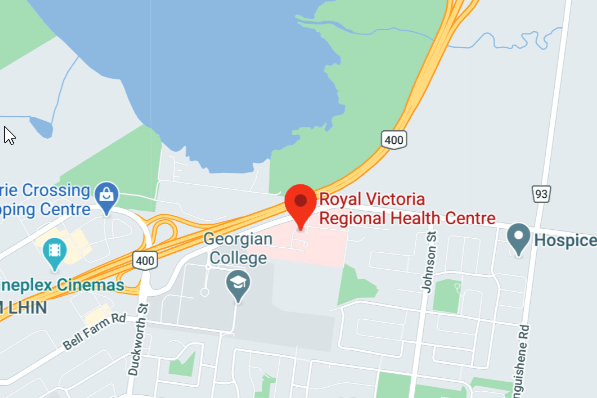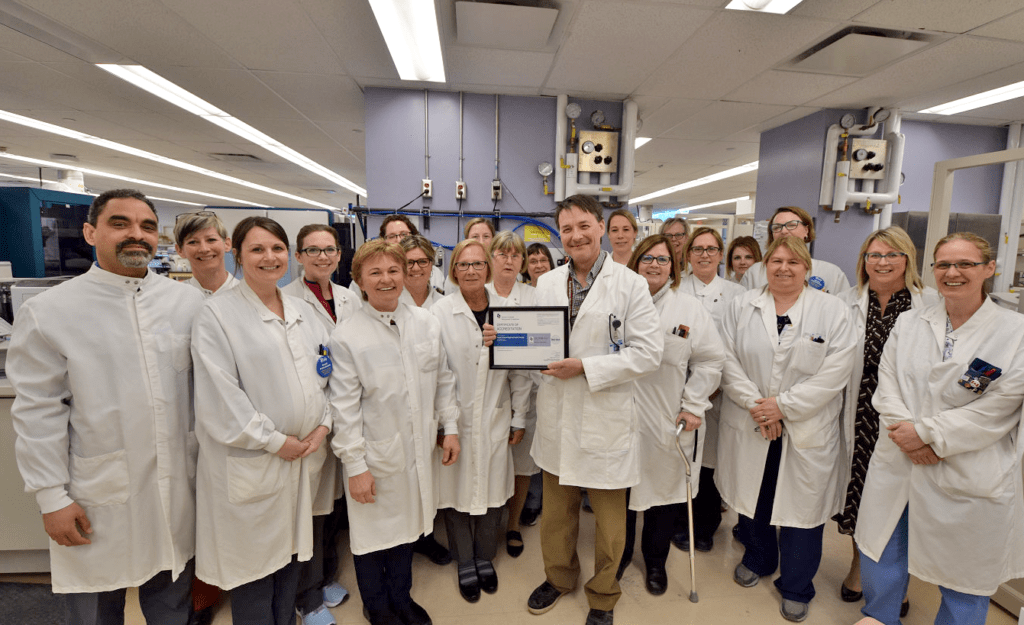Contact Us
Phone: 705-728-9090 Ext.43262
Supervisor Phone: 705-728-9090 Ext. 43280
Administration
Phone: 728-9090 Ext. 43220
Fax: 705-739-5685
Pathology Clerk: Ext. 43221
Quality Assurance: Ext. 43213
LIS Applications: Ext. 43282
Specimen Receiving
Phone: 705-728-9090 Ext. 43211
Fax: 705-739-5692
Report/Results requests please contact Health Records Phone: 705-728-9090 Ext. 42563
Specimen Collection
Hours of Operation: Monday – Friday 7:30 a.m. – 3:30 p.m. (excluding holidays)
Phone: 705-728-9090 Ext. 43262
Sweat Chloride Testing
Looking to book a Sweat Chloride Test?
Sweat Chloride Testing is a non-invasive procedure that measures the chloride content in sweat. This is used as a screening test for Cystic Fybrosis.
To book an appointment for this test, please call 705-728-9090 ext. 43221
Time and Location
Wednesdays
10:30 a.m.
1:30 p.m.
Specimen Collection clinic Level 1 (use Simcoe Entrance)
Laboratory Services Notice
Patient Instructions for Curb-side Pick-up of Blood Products
If you are a patient who usually picks up your blood products at the hospital, please be aware of the following process change. We have implemented this to ensure your safety and reduce your risk of potential exposure to illness. You will be contacted by Laboratory Services to advise you when your product(s) is ready for pick up.
Time and Location
Pick up times: Monday – Friday from 9 a.m. – 3 p.m.
Pick up area: Simcoe Entrance
On the day of pick-up
Please call Laboratory Services prior to leaving home at 705-728-9090 ext. 43242, and provide an estimated time of arrival to RVH.
Please bring your Health Card. When you arrive at the hospital, please remain in your vehicle and call 705 728-9090 ext. 43242 to notify us of your arrival including the colour and make of your vehicle.
You will be greeted by a member of the Laboratory Services team and will be asked to provide your name, date of birth and Health Card information.
Important Note: If you are a subcutaneaous immunoglobulin therapy (SCIG) patient, please continue to use your infusion logs. They will be submitted at a later date. You will be provided with blank forms along with your product(s).
Products will be placed in the trunk of your vehicle.
Many thanks in advance for working together to ensure your safety.
License
Ministry of Health and Long-Term Care Laboratory and Specimen Collection Centre Licensing Act
Accreditation
The Department of Laboratory Services at RVH has successfully participated in and has received many accreditation certificates.
American Society of Hematology
Bloodline - Hematology Education and News
Canadian Blood Services
Canadian Society for Medical Laboratory Sciences
College of American Pathologists
College of Medical Laboratory Technologists of Ontario
Lab Tests Online
Medical Laboratory Professionals’ Association of Ontario
Microbe World
Mount Sinai Hospital Department of Microbiology
Ontario Association of Pathologists
Public Health Agency of Canada
Institute for Quality Management in Healthcare
World Health Organization
Laboratory Services
The Blood Transfusion Service is committed to providing accurate results of ordered blood transfusion tests and safe and timely blood product transfusions for the patients of the community and region. This is achieved by working with members of health care teams and health care providers within RVH. Blood Transfusion Services works consistently with the Canadian Blood Services to ensure there is an adequate inventory of blood products for patient needs.
The Blood Transfusion Service:
• Pre-transfusion testing to provide serologically compatible blood products to patients
• Serological testing for diagnosis of immune disorders or evaluation of certain diseases
• Technical/medical expertise and storage facilities
• Coordinates storage and record keeping for bone banking
• Assists in training of medical laboratory technology students
Contact
Phone: 705-728-9090 Ext. 43242
Fax: 705-728-9194
The clinical Chemistry department of any laboratory incorporates a limitless variety of diagnostic methodologies and variations on established techniques to perform analytical determinations on patient samples. Such specimens may present in the form of serum, plasma, whole blood, cerebrospinal fluid, urine and a host of body fluids originating from a number of specific sites.
It is the role of the Chemistry department to adapt with advances in methodological sensitivity, specificity and rapidity to provide the physician with the clinically useful information required to diagnose, differentiate and monitor the patient’s clinical state. Established methodologies exist for assessment of cardiac, renal, liver, gastrointestinal and endocrinological function. Analytes measured vary from ions, enzymes, vitamins and hormones to drugs.
Any methodology or analytical system utilized by a Laboratory is subject to strict standardization and ongoing assessment through the use of quality control sampling and external proficiency testing. Quality Control material is designed to mimic the patient sample matrix (consistency), is of known relative analyte concentration and is characteristically run daily at levels reflecting clinically normal, abnormal low and abnormal high values. This will assess the performance of an instrument or system on a daily basis over the entire dynamic range of testing capabilities to ensure it is accurately reporting patient results. Plotting the values generated for quality control materials allows changes in performance to be identified and any such discrepancies to be acted upon.
Common tests performed in the Chemistry department range from electrolytes, cardiac (heart attack) markers, liver function tests, and renal (kidney) function tests to Drug screening (both prescription and drugs of abuse) among others.
The continuous advances made in measurement systems, which originally led to automation of manual techniques, are pushed on a continual basis to minimize sample volume while optimizing sample type. There are continuous checks on the system occurring in the background that eliminate both time consuming maintenance, troubleshooting and service procedures of the past to ensure the system is always ready for specimen analysis.
Contact:
Phone: 705-728-9090 Ext. 43219
Hematology Department
The word “Hema” means blood and “ology” means science, hence the word Hematology means the study of blood cells. Hematology is interested in the production, life span, and destruction of cells in the blood sample.
We are interested in white blood cells or leukocytes, red blood cells or erythrocytes and platelets. Technology is used to study these types of cells contained in a complete blood count. The Complete Blood Count allows the physician to diagnose and monitor infection, anemia, leukemia as well as monitoring blood loss or decreased production of the various cells required by the body.
Hematology at RVH utilizes an automated cell counter. The purpose of the instrument is to identify patient samples with normal parameters from patients with abnormal samples requiring additional studies. These studies may include further measurement of cell size, platelet distribution, manual white blood cells differential or any other definitive tests that assists the physician in diagnosing the patient’s condition.
The Hematology department also performs cell counts on other body fluid samples such spinal fluid, pleural and synovial fluids. The physician is interested in the presence and number of red and white cells.
Coagulation testing, a sub-specialty in Hematology, studies the “factors” in the patient’s plasma which are responsible for the clotting of blood. The physician is interested in these results when monitoring anticoagulant therapy (such as Coumadin or Heparin).
Coagulation samples must be analyzed within 4 hours of collection for accuracy and sample integrity. These tests are also a useful screening test to indicate deficiencies that may result from secondary causes like Vitamin K deficiency, liver disease, Hemophilia, Disseminated Intravascular Coagulation, Deep Vein Thrombosis, Pulmonary Embolism or hereditary coagulation disorders.
Contact:
If you are a hematology clinic patient please call: 705-728-9090 Ext. 23200
To reach the Hematology Laboratory Department please call: 705-728-9090 Ext. 43232
The Pathology laboratory consists of two areas: Histopathology and Cytopathology. Histology involves the study of tissue and Cytology involves the study of cells, both of which are derived from various organs of the human body.
The Histology laboratory is responsible for the preparation of tissue for diagnosis by Pathologists. The Histology laboratory receives any tissue or foreign body that has been removed by surgical or autopsy procedure. Tonsils, gallbladders, uteri, vas deferens, and moles are examples of tissue processed in the Histology department. As soon as the tissue is removed from the body, the tissue is fixed in a special liquid (10% formalin or other), to preserve the cellular makeup of the tissue in a lifelike manner. The Pathologist/Pathologist Assistant performs gross examination (physical examination on the tissue) to determine what testing procedures they will require to be performed by the technologists in order to make a diagnosis. After this, the specimens are processed in various grades of alcohol and xylene. The tissue specimens are then embedded in wax blocks, which are cut on a special instrument (microtome). The microtome produces thin slices of the specimen, which are transferred to slides. The slides are stained with a routine stain (to help differentiate between diseased and normal tissue). They are then delivered to the Pathologist for microscopic examination and diagnosis. In some cases, special stains may have to be performed on more complicated cases, to aid in diagnosis.
Sometimes, it is necessary for the surgeon to determine if he/she has removed all of the cancerous tissue from the patient while the patient is still under anesthetic. At this point, the tissue is sent from the Operating Room to the Histology department, quickly frozen and a slide is cut and prepared for review and a diagnosis is made, all within 20 minutes. It must be noted that not all testing can be performed in this manner due to the complexity of the testing methods.
The Cytology laboratory is capable of detecting microscopic cancerous and pre-cancerous changes that occur at the cellular level, often long before the clinical symptoms occur (i.e. the Pap smear). The cells are obtained by methods such as the Fine Needle Aspiration (lung, liver, thyroid, and breast); Washing and Brushing (esophagus, bile duct, lung, and bladder); or by gentle scraping of the visible outer lining of an organ (cervical Pap smear). In addition to detection of cancerous changes, diseases such as benign growths, various infections and yeast and trichomonas infestations, can be detected in this department. Cytology screening is often the initial test, performed prior to a more involved surgical operation or radiation/chemotherapy treatments.
Contact:
Histology Phone: 705-728-9090 Ext. 43226
Cytology Phone: 705-728-9090 Ext. 43225
The Microbiology Laboratory studies biology on a very small scale. Testing is performed on a large variety of specimens including urines, blood, throat swabs, faeces, wound swabs and sterile body fluids. Our primary focus is on bacteria but we also handle the testing for other microorganisms that may contribute to human illness, including myoplasmata, viruses, fungi, and intestinal parasites. Along with the specimens from RVH, we also process all the specimens from Midland and Penetanguishene (the North Simcoe Health Alliance) and from Alliston’s Stevenson Memorial Hospital.
All specimens arriving in the Microbiology Laboratory are logged into the computer. They then go into a Biosafety cabinet for “planting” onto specially formulated media in petri plates. There are many types of media, all of which serve a specific purpose. For example, sometimes there is the need to discourage growth of normal flora (bacteria present in organs of the body normally), so that a pathogen (disease-causing organism) can get noticed, and conversely, some pathogens are very delicate and need special growth factors to assist them in their growth. Most petri plates are incubated (stored in a warm cabinet) overnight at human body temperature. The air atmosphere in the incubator is suited to the type of organism that we might expect to encounter. Many bacteria prefer an increased level of carbon dioxide rather than normal air, and some prefer anaerobic (oxygen-free) conditions. What the organism likes depends on what part of the body the organism prefers to live in.
Once we identify a human pathogen, we perform “susceptibility testing” to determine which antibiotics will effectively kill it. This involves testing the pathogen against a wide selection and concentration of antibiotics in order to give the clinician choices for treatment. In our laboratory, much of the identification and susceptibility testing is performed using an instrument that compares the reactions of each pathogen being tested against a large database for comparison.
One of the most important tests performed by the Microbiology Laboratory is called the “Gram stain”. This staining method stains bacteria either pink (which is called gram negative) or purple (which is gram positive). As well, we can see whether organisms are round (cocci) or rod-shaped (bacilli). The stain takes minutes to perform, and gives the physician vital clues regarding the ultimate identification of the organism.
Microbiology performs routine screening for several “superbugs” including Methicillin – resistant Staphylococcus (MRSA) and Vancomycin – resistant Enterococci (VRE). We do a variety of “rapid” tests, notably for Strep throat, Influenza and Respiratory Syncytial virus. We also perform testing for Clostridium difficile.
The Microbiology Laboratory is in daily contact with the Infection Prevention and Control department of the hospital. Infection Prevention and Control is notified of all pathogens that could be public health concerns or that were acquired in the hospital so that appropriate actions may be taken to eliminate these infections. The Pharmacy often consults with Microbiology to discuss options for treatment when a patient has allergies to some drugs or if an organism is resistant to many antibiotics. We also receive calls for advice from some of the smaller Microbiology Laboratories in Simcoe County. Microbiology is involved in several studies that track susceptibility patterns of common pathogens across Ontario and nationally.
Contact:
Phone: 705-728-9090 Ext. 43271
Step by Step Directions
201 Georgian Drive, Barrie, ON L4M 6M2
Enter through the L2 Atrium Entrance. Across from Victoria’s Gift Shop.
Specimen Collection:
Street: Gallie Court
Travelling on Georgian drive you will pass Georgian College and TURN RIGHT onto the third entrance at Gallie Court. After the stop sign, proceed FORWARD and TURN RIGHT onto RVH’s Main road entrance.
Parking: Main
Proceed FORWARD through RVH’s Main road entrance. RVH’s Main Parking lot can be found ON YOUR RIGHT.
- You will see Rotary Place on your right followed by parking gates
Entrance: Main
Enter RVH’s Main building entrance and FOLLOW the Blue Navigation Line to the Atrium (Orange) elevators.
- You will pass Café Royale on your right
Elevator: Atrium (Orange)
Take the Atrium (Orange) elevators to LEVEL 1.
Registration: Surgery Treatment Clinic Registration From the Atrium (Orange) elevators, follow the Blue Navigation Line and TURN LEFT after Jugo Juice, passing the Fracture Clinic ON YOUR RIGHT. The Surgery Treatment Clinic Registration is at the end of the hallway ON YOUR RIGHT.
- You will see a volunteer at an information desk
Department: Specimen Collection Laboratory
From Surgery Treatment Clinic Registration, the Specimen Collection Laboratory is STRAIGHT AHEAD.
- You will pass Pre Surgery Treatment Clinic



